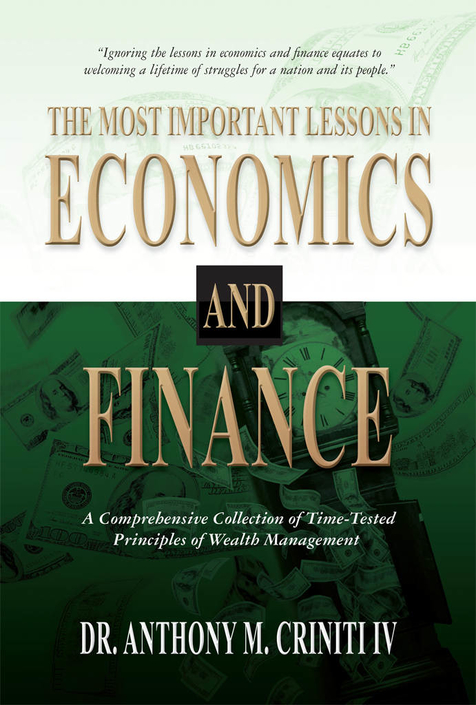An expert and educator in the realm of finance, Dr. Anthony M. Criniti IV has created more than two hundred principles by which he believes a serious student of finance may move from theory to practice in The Most Important Lessons in Economics and Finance: A Comprehensive Collection of Time-Tested Principles of Wealth Management.
Criniti makes his intentions clear in Part I, an introductory section in which he defines his terms, which he has chosen carefully: principles, for example, are an attempt to “reflect natural laws” that will endure, as opposed to “rules” that can be changed arbitrarily. The word “lesson” underscores his wish that readers will learn from his advice. He then offers the works of other authors whose writings have influenced the sciences of economics and finance. He fair-mindedly cautions that because he is human and has opinions, some portion of the materials presented will necessarily be somewhat biased, which is refreshingly open, as he is throughout this book.
Part II provides the weight of Criniti’s knowledge as it applies to practical approaches to economics and finance, i.e. how to gain and maintain wealth. The majority of the principles set forth concern business, and most will be familiar to anyone who has ever set out to open and run a business of almost any type. The basic admonitory principle is that “It can take a lifetime to build a solid business and moments to destroy it.”
General themes include that good ideas can become good businesses; competition is always a factor and competitors should be constantly studied; simplicity – selling one item at a time and moving forward at a steady pace – is always a strong strategy; maintaining wealth means not borrowing more than can be repaid; and, on a larger scale, good business improves the nation and that in turn improves conditions for all citizens. More specific sets of principles cover such necessary but often overlooked issues as Health, Ethics, and Personal Finance (Estate Planning, Retirement, even Shopping).
This work follows an earlier book, The Necessity of Finance, in which Criniti delineates the broad characteristics of finance, demonstrating how it has arisen in the mid-20th century as a science in its own right. This latest work is aimed at showing how to apply the scientific method of finance for individual or organizational gain. Criniti writes with intention and sincerity, using a diligently selected vocabulary in which terminology never deviates from its originally defined meaning. The 218 principles set out here will benefit both those in a business start-up mode and those in the midst of managing a financial operation of almost any sort. In accord with his academic background, Criniti offers two Questionnaires at the end of the book, with multiple-choice ratings to allow the reader to test their grasp of the general principles and rate them according to their perceived importance.
As with Criniti’s other work, this is a highly effective book presented with more sober authority than normally found in books on money management. Criniti advises that his book be read slowly, even as a sort of daily meditation on one principle at a time, so the book doesn’t offer slick bromides or unattainable goals. His ideas are interesting, sound, and practical and should be considered carefully by the target audience of students, entrepreneurial individuals, and organizations wishing to establish and maintain a successful business.
Uniquely authoritative, and therefore persuasive, The Most Important Lessons in Economics and Finance stands out in the genre of personal and business finance.
Book Links
STAR RATING
Design
Content
Editing
Get an Editorial Review | Get Amazon Sales & Reviews | Get Edited | Get Beta Readers | Enter the SPR Book Awards | Other Marketing Services
























Leave A Comment